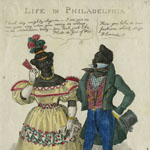 |
White responses to the black celebration, in addition to violence, included ridicule. Shown here is a cartoon from 1828 by Philadelphia’s Edward Williams Clay showing an ostentatious black couple. Miss Florinda admires her friend’s outfit, “I tink dey might elegum. I see you on New Year day when you carry de colour in de Abolition ‘siety.” |
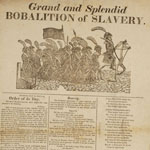
|
From Boston, 1822, is a parody of the black celebration, held on July 14 as a contra-fourth of July. These broadsides, which appeared regularly at the July 14 celebrations, ridicule the idea of black citizenship with comic text in a pseudo-black dialect filled with misspellings, mispronunciations, and malapropisms (i.e., “bobalition” for abolition), and occasionally crude illustrations. These anonymous productions range from as early as 1815 to as late as 1831, and, with the emphasis on corrupted dialogue, presage later racist productions like the minstrel show. Courtesy of Historical Society of Pennsylvania.
|
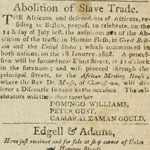 |
“Abolition of Slave Trade,” announcement of Boston blacks’ parade and meeting, in Columbian Centinel, July 14, 1808. |
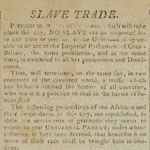
|
“Slave Trade,” announcement of Philadelphia blacks’ celebration, including proceedings of the December 12 planning meeting, in Poulson’s American Daily Advertiser, January 1, 1808. |
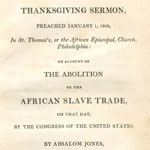 |
Absalom Jones, A Thanksgiving Sermon, Preached January 1,1808, in St. Thomas’s, or the African Episcopal Church, Philadelphia, on Account of the Abolition of the African Slave Trade, on That Day, by the Congress of the United States (Philadelphia, 1808).
As God did with the Israelites, so with the Africans, He “came down,” Jones preached, and moved the British and Americans to end the slave trade. Jones further looks towards Africa, wondering why God would permit such a horror as the slave trade. “Perhaps his design was that a knowledge of the gospel might be acquired by some of their descendants, in order that they might become qualified to be the messengers of it, to the land of their fathers.” |
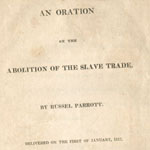
|
Joseph Sidney, An Oration, Commemorative of the Abolition of the Slave Trade in the United States; Delivered before the Wilberforce Philanthropic Association, in the City of New-York, on the Second Day of January, 1809 (New York, 1809).
Joseph Sidney celebrates the end of the slave trade and mourns the passing of the Federalists in this highly political oration condemning Jeffersonian Republicans. “No people in the world make louder pretensions to ‘liberty, equality, and the rights of man,’ than the people of the South. And yet, strange as it may appear, there is no spot in the United States, where oppression reigns with such unlimited sway.” |
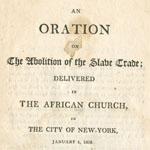 |
Peter Williams, Jr., An Oration on the Abolition of the Slave Trade: Delivered in the African Church, in the City of New York, January 1, 1808 (New York, 1808).
“Oh, Africa, Africa! To what horrid inhumanities have thy shores been witness; thy shores, which were once the garden of the world, the seat of almost paradisiacal joys, have been transformed into regions of woe” is the tone throughout this paean to a peaceful Africa destroyed by white avarice. Several in his audience were first generation Africans and he evoked their memories of home. Williams was aware that white opinion denigrated the intellectual ability of blacks and concludes his pamphlet with four endorsements from white clergyman and educators that he indeed is the author of his work. |
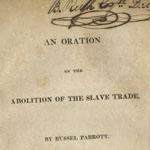 |
Russell Parrott, An Oration on the Abolition of the Slave Trade, Delivered on the First of January, 1812, at the African Church of St. Thomas (Philadelphia, 1812).
This is the first of three Abolition Day orations by this up-and-coming young man, a protégé of James Forten and Absalom Jones, and a candidate for the ministry at St. Thomas. Parrott particularly celebrates the abolitionists. “Had not a Benezet, a Sharp, a Woolman, a Dilwin, a Clarkson, a Rush, a Wilberforce and many other worthies been zealous in vindicating the rights of the injured African, we still should have to lament the existence of a trade, the bare mention of which fills the soul with horror.” |
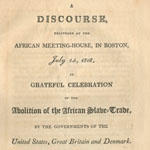
|
Jedidiah Morse, A Discourse, Delivered at the African Meeting House, July 14, 1808, in Grateful Celebration of the Abolition of the African Slave-Trade by the Governments of the United States, Great Britain and Denmark (Boston, 1814).
The celebration by the Boston blacks was an interracial affair, with this white Congregational minister as orator and the white Rev. William Ellery Channing conducting the religious service. The bondage of slavery is terrible, but the bondage of sin is worse, and Morse is among the many that see the ending of the slave trade as the opening of “the extensive spread of the glorious gospel among the African tribes, by which thousands, who are now in captivity to sin and Satan, shall be made free indeed.” |








